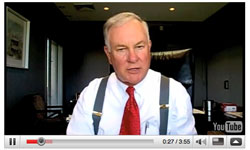During my radio days (70’s and early 80’s) it was common practice to check the job listings in the back of Broadcasting (a trade publication) to see who was hiring. (The main reason station managers didn’t leave the magazine lying round.) Most of those ads ended with “Tape and resume requested.”
The tape was also called an “air check” and usually worked something like this:
Let’s say I did a four hour air shift each afternoon. I would record it and later edit out everything except the parts where I was saying something clever or –at the very least– saying something in a deep, resonant voice.
If I was doing a record show, my air check consisted primarily of my introductions to songs. This was in the day when the DJ “talked over” the instrumental intro to a song and it was considered something of a skill to be able to chatter mindlessly right up the instant the vocal started. DJ’s prided themselves in knowing the exact length of the intros to popular songs.
So the air check –once it had been “telescoped”– had this weird “this is/that was” quality. I did a lot of air checks and they always reminded me of how little I was actually adding to the listeners’ experience.
And the voice was important back in those days. Deep, full, rich voices were highly prized. “What” you said was considered less important than “how” you said it. “Good pipes” were much in demand.
And many (most?) DJ’s had this strange, over-modulated, swallow-your-words way of talking. I’d give you an audio example but it’s too painful and embarrassing to recall.
It’s a short hop from one of those telescoped air checks to the realization that –with the new computers and software– a DJ could record his or her part of that four hour air shift in far less time. Which would mean we could cover more air shfits with fewer DJ’s and take all that money to the bank.
As the cost of satellite distribution came down, group owners figured out they could have a few talented folks in one part of the country “voice track” shows for LOTS of radio stations. Even more savings.
I remember spinning records for 5 or 6 hours at a time, and thinking this is not a good use of my great talent. But I’m really glad I didn’t miss that part of the radio experience. Going into a studio to voice-track several hours of “my show” would seem to be very… unsatisfying. Like being a sperm donor.
I don’t know what it’s like working at a radio station these days. I hope it’s still fun. I remember Charlie Earls (the owner of our station) saying something along the lines of: “If we make enough money to pay the bills, and have fun in the process, that’s a good deal.”
I’m thinking you don’t hear that much anymore.


 He shot the video by setting his Casio Exilim on the window sill (to get the best light) and ad libbing his post in one take. By the time I got there, he had the file on the desktop of his iMac and just wanted to know best way to trim the front and back. I showed him how to do that in iMovie and then gave him the login to my YouTube account.
He shot the video by setting his Casio Exilim on the window sill (to get the best light) and ad libbing his post in one take. By the time I got there, he had the file on the desktop of his iMac and just wanted to know best way to trim the front and back. I showed him how to do that in iMovie and then gave him the login to my YouTube account.